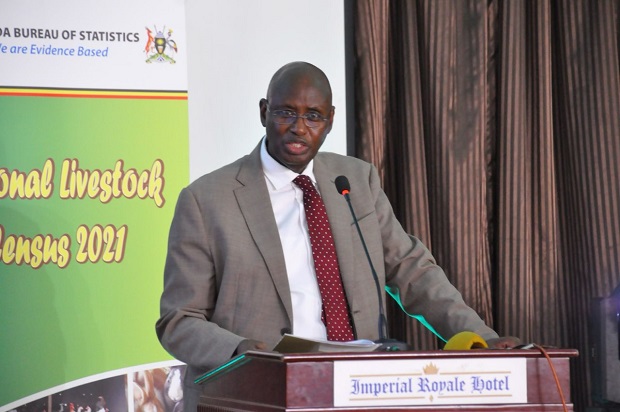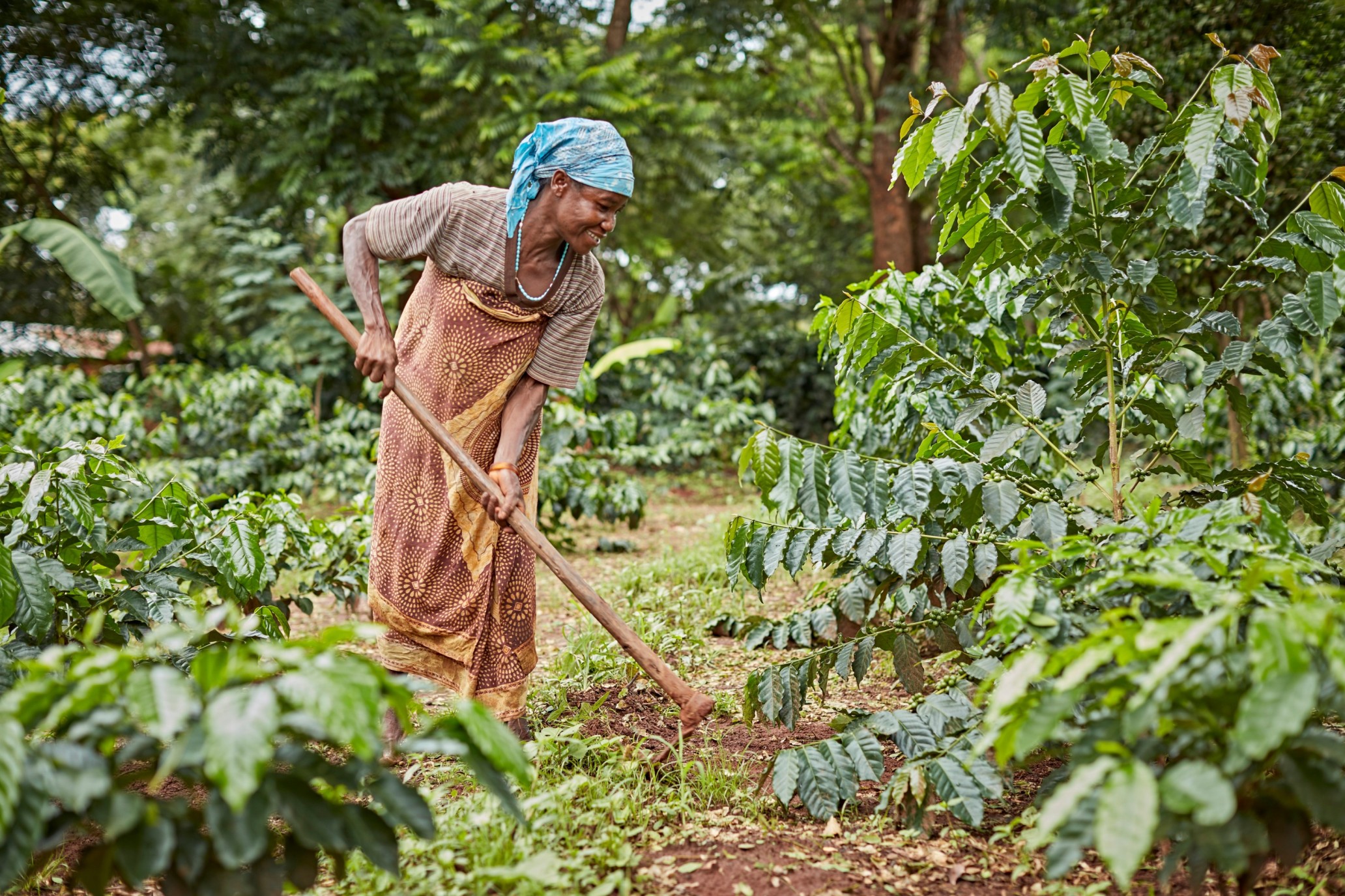Gordon Katwirenabo, the National Programme Coordinator for MARKUP at UCDA during the interview
Uganda Coffee Development Authority (UCDA) is currently implementing an EU funded government of Uganda project called the European Union – East Africa Community (EU-EAC) Market Access Upgrade Programme (MARKUP). The Programme is supporting the private sector to enhance production, productivity, improve harvest and post harvest quality practices and standards for the coffee and cocoa sectors.
Cocoa is one of the high value priority crops being promoted by the Government of Uganda as means of increasing household incomes in line with Vision 2040. However, the cocoa sector has received less focus compared to the coffee value chain despite its potential. Currently, a kilogram of dry cocoa beans goes for an average of Shs 7,500.
Business Focus on July 21, held an exclusive interview with Gordon Katwirenabo, the National Programme Coordinator for MARKUP at UCDA to understand the current status of cocoa production in Uganda, opportunities and the future outlook among others.
Below are excerpts from the interview.
Q: What is the EU-EAC Market Access Upgrade Programme (MARKUP) about?
A: This is a Government of Uganda project funded by the European Union up to the tune of EUR 3,680,000 (UShs14.4bn). It is a four-year project that will end in December 2023. It is focusing on two value chains; coffee and cocoa. The project aims to enhance market access to EU and the East African region by supporting private operators in the coffee and cocoa value chains to improve quality and quantity of the produce and retain premium prices for these commodities through selling to niche markets.
Q: What is the current status of cocoa growing and production in Uganda?
A: Currently, as per the Uganda Revenue Authority (URA) report, cocoa volumes produced increased from 14 metric tonnes of cocoa beans in 2009 to around 32 metric tonnes in 2019. This represents a 54% increase.
Currently, it is estimated that production stands at just above 40 metric tonnes with most beans exported outside Uganda as raw beans. The cocoa sector in Uganda has great potential which has not been exploited. If you look at the world trends in terms of cocoa producing countries, there’s quite a wide gap in volumes between major producers and Uganda yet we (Uganda) have a favourable climate and idle land [that can be exploited] to expand production.
We also have a comparative advantage. When you look at major producers like Indonesia, production is decreasing, so this is a great opportunity for Uganda to increase production and fill the demand gap for cocoa beans as well as value added products from cocoa beans.
I think it is one of the most valuable value chains we have in Uganda.
Q: Where in Uganda is cocoa grown?
A: Cocoa in Uganda is mainly grown in the Western part of the country. Specifically, over 70% of cocoa in Uganda is grown in Bundibugyo district. However, there are surrounding districts that have a great potential. These include Ntoroko, Kabarole, Kagadi, Kibaale, Kakumiro, Kyenjojo, Kikuube, Bunyangabu, Kasese and Kyegegwa. There are reports and studies to show that parts of Kamwenge district can support cocoa growing as well.
We also have the Eastern region as another major Cocoa growing area which comprises of Buikwe, Mayuge, Kayunga, Jinja, Namayingo and parts of Mukono districts. These are historical cocoa growing areas but we still have a potential to expand from the current areas where cocoa is grown to other new areas. The future of cocoa growing in Uganda will be in new areas. There have been reports of cocoa growing in some parts of North region but that is yet to be scientifically confirmed. We planing a profiling exercise for potential cocoa growing areas and we hope by next year, we should be able to secure funds to undertake that survey very soon. I’m sure, the survey will discover new areas in Uganda that can support cocoa growing.
Q: How is UCDA promoting cocoa growing and production in Uganda under the MARKUP Programme?
A: First, the potential of cocoa as a commodity has not been fully harnessed for a long time and cocoa has not been given the focus that it deserves.
That’s why the Government of Uganda through UCDA in partnership with the EU got funding to undertake some of the interventions that will bring cocoa to its [desired full] potential.
There were little literature on the sector, our first intervention was commission the cocoa production survey and Cocoa demand and supply Chain analysis report.
These two surveys highlighted the potential, the challenges and the interventions that we can undertake to address the above constraints and ensure that cocoa achieves its full potential.
After that, we realized that even to undertake the highlighted interventions under those surveys, we needed a legal framework, so we commissioned a regulatory impact assessment as a first step towards the development of a regulatory framework.
We conducted stakeholder consultations on the current sector quality controls and what should be done to strengthen the legal framework for cocoa.
I’m happy to report that the regulatory impact assessment was was undertaken and approved by the Top Policy Management Committee (TPMC) of the Ministry of Agriculture, Animal Industry and Fisheries (MAAIF) in February 2021.
That opened the way for the formation of a cocoa law. We have now started on the process of drafting the principles of the cocoa bill. We have so far consulted with key opinion leaders, farmers and value chain actors including exporters, processors, political and local government leadership on key principles that will inform the formation of the bill.

We hope to undertake one final national consultation that will be composed of all value chain actors, opinion leaders and political heads in Kampala where we will present the findings from those consultative processes and come up with the final consensus on the contents of the proposed Principles of the cocoa bill.
After that, we will present it to the Top Policy Management Committee of MAAIF for approval and endorsement by the Minister for the process to proceed.
This will be a springboard that will help the cocoa value chain achieve its potential.
MARKUP has also highlighted the potential in the Cocoa industry attracting Government to include cocoa as a priority Commodity for the country and that’s very good news for the cocoa value chain.
That means that the Government can now attract funds that will support the development of the cocoa value chain.
Under MARKUP, UCDA in collaboration with Uganda National Bureau of Standards (UNBS) has developed four cocoa related standards; the standard for cocoa beans, the standard for cocoa butter, the standard for cocoa powder and powder mixtures and the standard for chocolate and chocolate products.
The standards were adopted and gazetted in February this year by the East African Standards Council after harmonization at the East African level. Currently, we have over 20 exporters and we expect them to comply with the new standards and refrain from using their own private standards to trade in cocoa.
Q: Tell us how you are building capacity in the sub sector.
A: UCDA under MARKUP has been able to build capacity of sector players.
We have undertaken various training in collaboration with International Trade Centre specifically in cocoa-growing regions. We have trained farmers in sustainable production systems, good agronomic practices,Agroforestry, fermentation practices, post-harvest-handling and how to produce value added products such as chocolates, cocoa cake, cocoa butter and cocoa oil. I am sure there are a number of cottage industries that have come up because of the training and the capacity we have built under MARKUP.
In June this year, we facilitated two value chain actors Semuliki Cooperative Union and Native Group of Companies to attend the CHOCOA Expo in Amsterdam to market their cocoa in Europe.
These are companies whose capacity has been built under MARKUP.
They made a number of deals including a deal to supply up to two containers of cocoa beans. They also got long term sustainable partnerships with importing and chocolate making companies who will be buying their cocoa straight from the farm up to Europe.
Under MARKUP, we have also developed an agronomic handbook for the cocoa value chain because there was a huge gap in cocoa specific extension services, harvest and post harvest and quality related issues. The manual will guide the value chain actors right from the farm to post-harvest handling to optimize returns. It will be printed and distributed after approval by the appointed Technical Working Group.
Under MARKUP, UCDA has also drafted a cocoa directory which is a one stop-point with information related to cocoa and coffee to support business and trade.
Under MARKUP, we have supported the National Coffee Research Institute (NaCoRI) in Kituza, Mukono to undertake applied research to develop and bring to market high yield and disease resistant Coffee and Cocoa varieties to enhance production and productivity.
Q: I see cocoa being added on to coffee as one of the crops to be managed by UCDA. In your opinion, won’t this be too much work for the Authority? Can UCDA ably manage the two cash crops?
A: First, you need to look at the historical background as well as what other cocoa producing countries are doing.
During the time of Coffee Marketing Board (CMB), before UCDA came into existence in 1991, the CMB used to handle both coffee and cocoa. In Ivory Coast, the regulatory authority is called Cocoa and Coffee Board. All producing countries that have both cocoa and coffee, these commodities are handled by the same Board or Authority under the similar legal and regulatory framework. This is because these two commodities are very similar right from the agronomic to post-harvest handling, marketing, quality control and certification. UCDA already has the institutional structures right from the Parish level up to the national level. We have trained Parish Coffee Advisors at Parish level, Coffee Extension Officers at District level to deliver specific extension services.
We are therefore fully grounded and have the trained personnel to handle the agronomic extension, technical and quality certification processes.
UCDA, therefore in many avenues offer the most cost effective, administrative, technical and institutional arrangement to handle the activities of the cocoa value chain for increased house hold incomes. All we need is a legal mandate to manage these additional activities for the cocoa value chain.
Q: Besides growing cocoa, what other opportunities exist along the cocoa value chain that can be exploited?
A: There are opportunities to do with trading, setting up processing industries that can add value to the cocoa beans and export of finished products like chocolates and chocolate products.
There are opportunities of setting up large scale commercial farms on the available unexploited land.
We also have challenges with access to quality packaging materials and packaging factory presents a great investment proposal.
It is also important to note that Government under the third National Development Plan (NDP III) highlighted and provided for the establishment of two cocoa processing factories. These will require a lot of cocoa and other inputs presenting massive investment opportunities for the sector.
There are also investment opportunities in processing equipment, storage facilities, warehousing, clearing and forwarding.
Q: What’s the future outlook for the cocoa industry in Uganda? Where do you see the sector five years from now?
A: Cocoa production in Uganda has been increasing since 2009 at an average of 54% annually and I think that’s one of the biggest increase in the agricultural value chain.
With the anticipated, streamlining of the legal framework for the cocoa industry, strengthened applied research into the right cocoa varieties in terms of yield, quality together with availability of cheap land for cultivation and favorable weather, I see the profitability of the cocoa sector increasing an exponential rate in the next 10 years.
Uganda Cocoa will continue to attract more foreign direct investment because of its unique qualities, it’s grown organically with little or no chemical used making it highly demanded on the international market.
Last word….
UCDA is committed to supporting the development of Coffee and cocoa value chains. We shall continue to engage Government and different development partners to get more funding to address the challenges of the sector for increased production , productivity, quality and increased households incomes.
We thank the EU that has provided an additional funding of up to EUR 8m (UShs31.5bn) under the Inclusive Green Uptake Economy Programme through the Coffee and Cocoa Development (CoCoDev) Project in Uganda to expand the scope of current MARKUP interventions and even address new challenges for sustainable positive impact on the lives of coffee and cocoa farmers in Uganda.
UCDA will continue to strengthen the legal framework for both commodities, support the establishment of large scale commercial coffee and cocoa farms and applied Research into the development of high yielding and disease resistant coffee and cocoa varieties for target markets.







As farmer’s organisation, I am a marketing manager at Tropical Rwenzori Farmer’s cooperative society limited in Bundibugyo. We need more capacity building to these organisations to see quality management and cocoa production in Uganda. UCDA should involve us in trainings and connecting organisations to funding.
As farmers from bundibugyo we have benefited from UCDA MARK UP PROGRAM, we have learnt so much about best cocoa farming practices, marketing and other related issues so we are so appreciative and however I kindly request the stakeholders, government and UCDA again to gradually attract more trainings about cocoa since now the production is lowering but I think we need more disease resistant seedlings to farmers and establishment of a research institute centre in bundibugyo to check issues of productivity